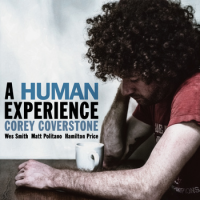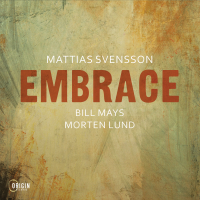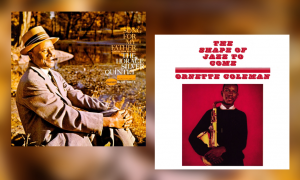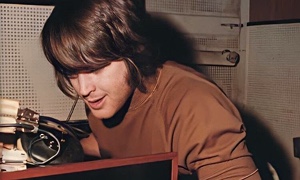Home » Jazz Articles » Building a Jazz Library » McCoy Tyner
McCoy Tyner
Suffice it to say that McCoy's career doesn't end there and that since Coltrane he has been able to become quite a viable leader and important musical voice himself. Moreover, while the sound of the Coltrane quartet has always informed his musical sensibilities to a certain extent, there is also much in McCoy's music that would lead one to believe that "Coltrane's pianist" had plenty of his own original ideas. Records like The Real McCoy and Expansions show a composer at work who had a unique ability to create powerful, epic themes that were also dynamic vehicles for improvisation. A sensitive, reflective side of this musician was also shown in memorable songs like "Contemplation" and "For Tomorrow."
McCoy has worked for some of the best musicians in jazz in his career and many of these same musicians have worked for him. Joe Henderson, Wayne Shorter, Gary Bartz, Woody Shaw, Bobby Hutcherson, George Adams, and Steve Turre are just some of the soloists who have found a place in McCoy's bands.
McCoy Tyner's career as a recording artist has spanned four decades and his career has been as varied as it has been long. His recording career is typically dissected into his Impulse, Blue Note, and Milestone phases; as he recorded for each label, he typically moved into a different stylistic realm. The nature of each realm is discussed in some part within the suggestions below.
The past decade or so has seen Tyner become increasingly eclectic. He has established himself as a reputable big band leader, cut a series of solo records with romantic interpretations of jazz standards, and had associations with Stephane Grappelli, Steve Grossman, and Michael Brecker. There is also no doubt that the Tyner's piano style has also changed over time; since the late 1970s, it has tended increasingly to bravura and pure volume, and given to some unflinchingly romantic interpretations of both standard repertoire and the Coltrane songbook.
 | Inception (1962) Early McCoy on Impulse was something of a different animal than the sound many would associate with McCoy Tyner. This was highly melodic and more understated music in contrast to the muscular modalism that would develop later. Mulgrew Miller has drawn a lot of inspiration from this era of Tyner's career. |
 | The Real McCoy (1967) This record contains only 100% classic Tyner compositions, all masterfully read by Joe Henderson on tenor. Every tune here has since become a jazz standard, but most sublime are the very searching, epic themes of "Contemplation" and "Search for Peace." |
 | Expansions (1968) McCoy's finest hour shows him to be a modernistic visionary as a composer and his soloing here ranks as some of the most intense he has played on record. "Smitty's Place" is also one of the most "out" situations Tyner led: Dig the double soloing by Wayne Shorter and Gary Bartz set against Elvin Jones' slamming drumsÃ?—?intense! Out-of-print BUT available through some online and used music stores. |
 | Extensions (1970) Another "excellent record cut late in his Blue Note stint; as the cover may suggest, this is expressly Afrocentric jazz in both in the musical and extramusical "messages" of the record. "Message from the Nile" is typical; based on a repeating chant-like figure, it has the hopeful and persistent emotional quality one might associate with the survival of one's people. This is a certain timepiece of the late 1960s, not to mention the Afrocentric, period of Tyner's career. |
 | Song of The New World (1973) While Tyner had a clear penchant for an "epic" sound, this is rather powerful even by his standards. One will rarely hear a rendition of "Afro Blue" as exalted and uplifting, with its full complement of heavy brass. A ride from start to finish. |
 | Supertrios (1977) Features two separate "Supertrios": One with Ron Carter and Tony Williams and another with Eddie Gomez and Jack DeJohnette. An excellent showcase for the more blatantly powerhouse, even grandiose, style that Tyner evolved during the 70s, and both trios hold little back here in convincing of their "super-iority." Tyner finds in Williams both a rival and a foil for his swift brand of intensity. |
 | The Greeting (1978) This recording shows Tyner and one of his 70s Milestone-era configurations (featuring George Adams and Joe Ford) playing in peak form before a live audience. There are other notable live McCoy records, including the oft-mentioned Enlightenment also on Milestone, but this features a diverse program both in music and in spirit, and so earns the nod as being slightly above the pack |
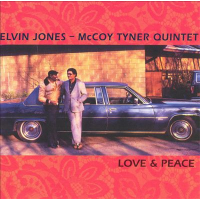 | Elvin Jones / McCoy Tyner Quintet: Love and Peace (1978) This record with Pharaoh Sanders is an excellent example of powerful, spiritual post-Coltrane jazz and Tyner's solos on here are frequently quite intense. Check his solo on "For Tomorrow" for a perfect example of the drama that Tyner can muster within only a few choruses. The recorded sound is not great, yet in some sense the rawness befits the intensity |
 | McCoy Tyner / Stephane Grappelli: One on One (1990) This completely improbable combination had a unique chemistry and was able to work together a number of times. Here they interact on a program of jazz standards where both are free to indulge in full-bodied romanticism, both in soloing and support. A good intro to Tyner's more traditional side. |
 | Best of McCoy Tyner Big Band (1991-93) While many thought it unlikely that Tyner would become a big band leader, his band became a beacon of modern big band sound in the early 1990s and won several Grammy Awards. A fine compilation which includes a lot of the material from Turning Point, the real golden nugget of Tyner's big band records. |
 | Soliloquy (1991) While McCoy gained notoriety for a number of solo records cut in the '90s, this one is possibly the most special. The concert hall sound gained from recording in Merkin Hall lends his grand, romantic solo style an even greater sense of power. Moreover, the choice of material here is personal in tone and offers reflective musings in turn. |
Tags
McCoy Tyner
Building a Jazz Library
AAJ Staff
United States
Wayne Shorter
Bobby Hutcherson
Joe Henderson
Gary Bartz
Woody Shaw
George Adams
Steve Turre
Stephane Grappelli
Steve Grossman
Michael Brecker
PREVIOUS / NEXT
Support All About Jazz
 All About Jazz has been a pillar of jazz since 1995, championing it as an art form and, more importantly, supporting the musicians who make it. Our enduring commitment has made "AAJ" one of the most culturally important websites of its kind, read by hundreds of thousands of fans, musicians and industry figures every month.
All About Jazz has been a pillar of jazz since 1995, championing it as an art form and, more importantly, supporting the musicians who make it. Our enduring commitment has made "AAJ" one of the most culturally important websites of its kind, read by hundreds of thousands of fans, musicians and industry figures every month.




